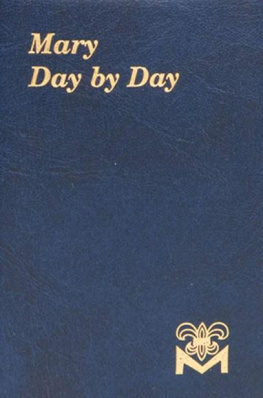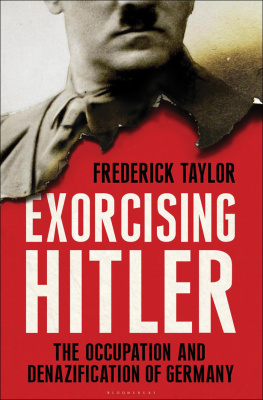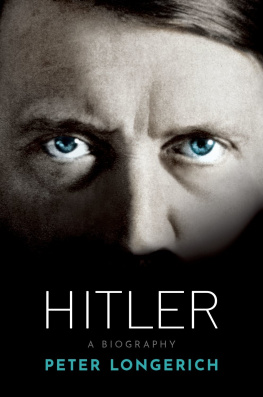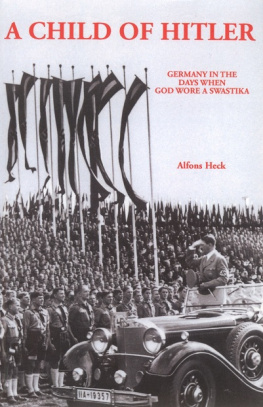CINEMA IN DEMOCRATIZING GERMANY
1995 The University of North Carolina Press
All rights reserved
Manufactured in the United States of America
Library of Congress Cataloging-in-Publication Data
Fehrenbach, Heide.
Cinema in democratizing Germany : reconstructing national identity after Hitler / by Heide Fehrenbach.
p. cm.
Includes bibliographical references (p. - ) and index.
ISBN 978-0-8078-2204-3 (cloth : alk. paper).ISBN 978-0-8078-4512-4 (pbk.: alk. paper)
1. Motion picturesPolitical aspectsGermany (West) 2. Motion pictures Social aspectsGermany (West) 3. Motion picturesGermany (West)History. I. Title.
PN1993.5.G3F35 1995
791.43 0943 09045dc20 94-33816
CIP
The paper in this book meets the guidelines for permanence and durability of the Committee on Production Guidelines for Book Longevity of the Council on Library Resources.
99 98 97 96 95 5 4 3 2 1
Earlier versions of chapters 3, 4, and 5 have appeared in print as Die Snderin or Who Killed the German Male?: Early Postwar German Cinema and the Betrayal of Fatherland, in Gender and German Cinema: Feminist Interventions, vol. 2, German Film History/German History on Film, edited by Sandra Frieden et al., 13560 (Providence: Berg, 1993); The Fight for the Christian West: German Film Control, the Churches, and the Reconstruction of Civil Society in the Early Bonn Republic, German Studies Review 14, no. 1 (February 1991): 3963; and Cinema, Spectatorship, and the Problem of Postwar German Identity, in The American Impact on Postwar Germany, edited by Reiner Pommerin, 16595 (Providence: Berghahn Books, 1994).
THIS BOOK WAS DIGITALLY PRINTED.
For my parents,
Gladys Lucia Fehrenbach
and
Herbert Frank Fehrenbach
CONTENTS
ILLUSTRATIONS
A scene from Helmut Kutners controversial film parody of the Adam and Eve story, Der Apfel ist ab
Wolfgang Staudtes Die Mrder sind unter uns, the first postwar German film
Adam and Eve in the Garden of Eden, from Helmut Kutners Der Apfel ist ab
Evenings in Hell with a tuxedoed Devil, from Der Apfel ist ab
A protest in Cologne against Willi Forsts Die Snderin
Marina (Hildegard Knef) and Alexander (Gustav Frhlich) in the double death scene of Die Siinderin
Federal President Theodor Heuss at the October 1951 Film Poster Exhibit in Bonn
Helga Ldersen (Sonja Ziemann) and Walter Rainer (Rudolf Prack) in Hans Deppes Grn ist die Heide
Brbel (Sonja Ziemann) wins a red Ford convertible in Hans Deppes Schwarzwaldmdel
A poster for Veit Harlans Anders als du und ich
The dramatically lit Klaus (Christian Wolff) and Dr. Boris Winkler (Friedrich Joloff) in Anders als du und ich
A night of heterosexual sex has cured the sons unsure masculinity in Anders als du und ich
The Subject, in Wolfgang Staudtes controversial film parody of the German past, Der Untertan
Robert Mertens (Gtz George), a youthful deserter from the German Wehrmacht, in Wolfgang Staudtes Kirmes
The rebels of Oberhausen, 1962
Spiritual desolation in Herbert Veselys early effort, nicht mehr fliehen
The opening of the fifth Berlin International Film Festival, 1955
German heartthrob, Hans Albers
Autograph hunters on the Kudamm during the 1955 Berlin International Film Festival
ACKNOWLEDGMENTS
I have benefited from the support of many individuals and institutions over the course of this project and am delighted to have reached the point where I can at last thank them in print. The late Harold Poor won me over to the study of modern German history during my undergraduate years with his captivating lectures on the subject; I am grateful for his crucial early influence, wisdom, and support throughout graduate school. Victoria de Grazia first stimulated my interest in the cultural dimensions of Americanization and continues to be both an intellectual inspiration and an invaluable critic. I am also indebted to Robert Moeller, who patiently waded through various drafts of this project and, in a spirit of generosity and good humor, doled out astute insights, helpful criticisms, and large doses of encouragement. My thanks also go to Volker Berghahn and Omer Bartov for raising thought-provoking questions in response to individual chapters; to John Gillis and Miriam Hansen for providing careful readings and helpful comments in the early stages of this project; and to Paul Clemens and Ursula Hardt.
This book would not have been possible without the generous financial assistance of various institutions. A grant from the German Academic Exchange Service in 1987 facilitated my early research in German archives, and fellowships from the Rutgers University Graduate School and the Rutgers Center for the Critical Analysis of Contemporary Culture provided crucial financial and intellectual support. I am grateful to the Colgate University Research Council for a major grant in 1992-93, which allowed me to return to Germany to complete research for the book, and for a second grant in 1993-94, which enabled me to enlist the aid of David Cappillo, who deserves my thanks as a diligent research assistant.
Numerous archivists and librarians have extended indispensable assistance in Germany and the United States. I would like to thank Herr Rdiger Koschnitzski at the Deutsches Institut fr Filmkunde in Frankfurt, Herr Peter Latta at the Stiftung Deutsche Kinemathek in Berlin, Herr Dr. Saupe at the Bayerisches Hauptstaatsarchiv in Munich, Herr Volker Viergut at the Landesarchiv Berlin, Herr Fischer at the Landesbildstelle Berlin, Herr Teutsch at the Stadtarchiv in Mannheim, Herr Hecker at the Stadtarchiv in Munich, Ned Comstock at the Cinema Library of the University of Southern California, Los Angeles, and the research staff at the National Archives in Suitland, Maryland, for their patient responses to my inquiries.
My thanks to John Pommer for generously allowing me access to the personal papers of his father, Erich Pommer, and to both John and Heidi Pommer for welcoming me into their home and sharing their reminiscences about postwar Germany and exiled Germans in Hollywood. Enno Patalas and Fee Vaillant consented to be interviewed about their contributions to the German film club movement in the 1950s and supplied important insights that could not be culled from archival or published sources. I owe a debt of gratitude to Eric Rentschler for offering helpful suggestions, access to his personal film archive, and hospitality in both Berlin and Irvine; and to Richard McCormick for relieving my desperation by graciously sharing his German films on video. At the University of North Carolina Press, I would like to thank Lewis Bateman for his early and ongoing interest in my project, managing editor Ron Maner, and my editor, Paula Wald, for her good judgment and meticulous attention to text and detail.
On a more personal level, Id like to express my heartfelt thanks to Bob Mensel and Jennifer Ham for their valued friendship and wise input; to my sister, Lori Fehrenbach, for a timely rescue in Berlin; and to Joseph Rotola and my family for patiently supporting me in a myriad of ways during the long life of this project. Finally, special thanks to David Buller for his editorial suggestions and companionship over the past two and a half years.
ABBREVIATIONS
The following abbreviations are used throughout this work. Additional abbreviations used only in the notes are listed at the beginning of the notes section.
BUFABild- und FilmamtCDUChristlich-Demokratische UnionCSUChristlich-Soziale UnionDEFADeutsche Film AktiengesellschaftDEGETODeutsche Gesellschaft fr Ton und BildEKDEvangelische Kirche in DeutschlandFBSFilmbewertungsstelle der LnderFBWFilmbewertungsstelle WiesbadenFIAPFFdration Internationale des Associations de Producteurs de FilmsFKBFilmkreditbankFSKFreiwillige Selbstkontrolle der FilmwirtschaftHICOGOffice of the U.S. High Commissioner for GermanyICDInformation Control Division (later Information Services Division [ISD])IMGInformational Media Guaranty ProgramJCSJoint Chiefs of StaffMPAAMotion Picture Association of AmericaMPBMotion Picture Branch (of the ICD/ISD)MPEAMotion Picture Export Association of AmericaOMGUSOffice of the Military Government for Germany, United StatesOWIOffice of War InformationPWDPsychological Warfare DivisionSPDSozialdemokratische Partei DeutschlandsSPIOSpitzenorganisation der FilmwirtschaftUFAUniversum-Film-AktiengesellschaftUFIUfa-Film GmbH










